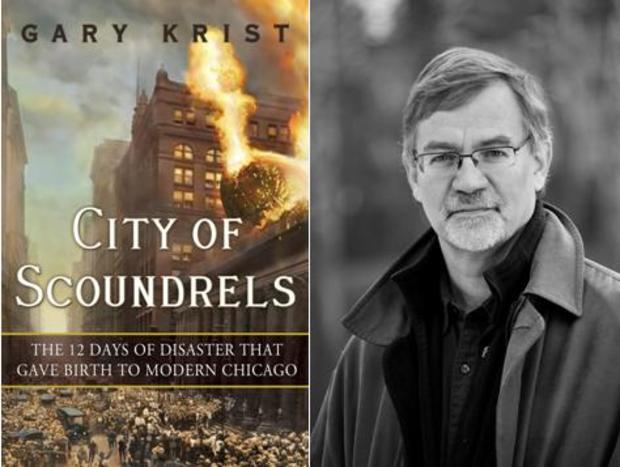"City of Scoundrels: The 12 Days of Disaster That Gave Birth to Modern Chicago," by Gary Krist
Jeff Glor talks to Gary Krist about "City of Scoundrels: The 12 Days of Disaster that Gave Birth to Modern Chicago"
Jeff Glor: What inspired you to write the book?
Gary Krist: Cities are, in my opinion, humanity's greatest invention, and I'm fascinated by the way they come into being. The process is always tumultuous, involving a series of epic conflicts that bring out both the best and the worst of human nature. That's why, as a storyteller, I'm so attracted to urban history, and to Chicago history in particular. Because Chicago was the quintessential city of immigrants--and one that, unlike New York, grew from nothing to full-blown maturity in the space of decades--it went through a particularly dramatic version of this growth process. And it was one that put to the test the whole American idea of a heterogeneous democracy. Basically, the question was: Could this vastly diverse group of refugees from every corner of the globe really come together and, despite their manifold hatreds and competing interests, successfully transform a former frontier village into one of the economic powerhouses of the world? No one really knew for sure. So Chicago was actually a grand experiment. And there were times--as in the disastrous summer of 1919 that I write about in "City of Scoundrels"--when it looked as if the entire experiment might come crashing down under the weight of too many different groups of people wanting too many different things.
JG: What surprised you the most during the writing process?
GK: I was amazed at just how unstable and contentious American urban life could be, even as late as 1919. We think things in the US are precarious today, with a looming terrorist threat and a populace constantly at war with itself on basic principles; but our lives in 2012 are a model of security and civility compared to what they were just 100 ago. In 1919, you had vast numbers of workers on strike or locked out of their jobs, bombs going off weekly in offices and apartment buildings, black and white neighbors killing each other on the streets, and a rising sense of the dangers posed by everything from the stranger living next door to the brave new technologies on the street and in the air (in Chicago's case, it was a new-fangled blimp crashing into a downtown bank). Americans in 1919 were living through the rough adolescence of the Modern Age, when change was happening so fast that our ability to control those changes couldn't keep up. Compared to that kind of chaos, the uncertainties of contemporary urban life seem like child's play.
JG: What would you be doing if you weren't a writer?
GK: Honestly, despite my love of cities, I think I'd be a marine biologist. I grew up addicted to Jacques Cousteau, Wild Kingdom, and other TV nature shows, which I'd always watch with my equally addicted father. (I remember my mother once lamenting, "Please, can we watch something about human beings for once?") Even now, my affection for penguins, otters, and dolphins is a source of much amusement in my household. And there are often times when I'm fed up with the abstract quality of what I do and would like nothing more than to be out on a Zodiac boat, tagging elephant seals off the coast of New Zealand.
JG: What else are you reading right now?
GK: After work hours, I like to read novels from the period I'm writing about (one great discovery for me was early Chicago novelist Henry Blake Fuller). But I also try to keep up with more current books. I love Alan Furst's espionage novels, and "The Foreign Correspondent" is currently on my nightstand. I'm also catching up with "Colonel Roosevelt," the third installment of Edmund Morris' massive biography of Theodore Roosevelt. TR has made cameo appearances in my last two books, and I've always found him an intriguing character.
JG: What's next for you?
GK: I'm working on another city book, this one about Victorian- and Progressive-era New Orleans. It's turning out to be another fascinating project, since I'm dealing with subjects like the unique culture of the Storyville vice district, the birth of jazz, and the rise of organized crime in America. And then there's also the pleasure of frequent mandatory research trips to New Orleans...
For more on "City of Scoundrels" visit the Random House website.

